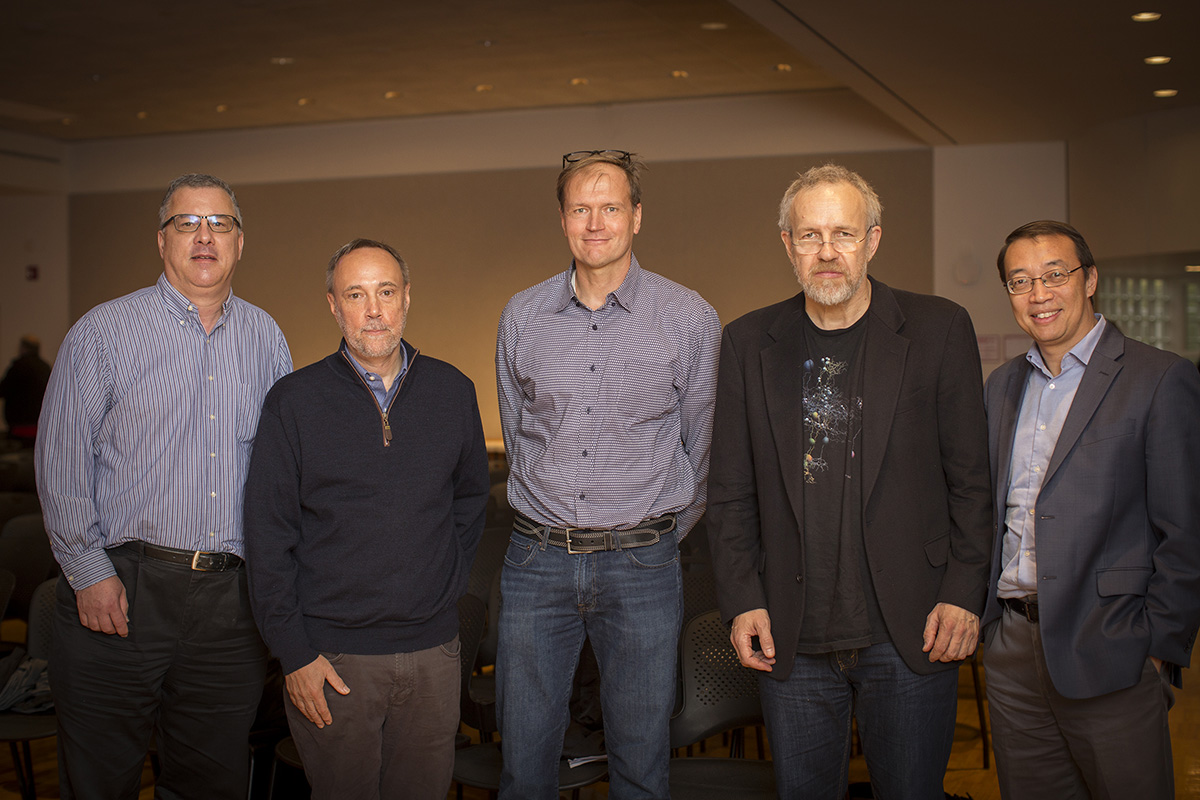Neurotech symposium on the brain spotlights new discoveries
By Linda B. Glaser and Syl Kacapyr

Researchers plumbing the mysteries of the brain gathered to share their discoveries at the inaugural Cornell Neurotech Mong Family Foundation Symposium, Sept. 29 in the Biotechnology Building.
The daylong symposium featured three of the winners of the prestigious Brain Prize – Winfried Denk, Ph.D. ’89; Karel Svoboda ’88; and David Tank, M.S. ’80, Ph.D. ’83 – all graduates of Professor Emeritus Watt Webb’s applied physics laboratory. The three built on their work in the Webb lab to develop multiphoton microscopy as an essential tool in brain research, allowing observation of minute brain structures and dynamic brain functions in real time.
Provost Michael Kotlikoff began the day with thanks for the “extraordinary generosity” of the Mong Family Foundation, guided by Stephen Mong ’92, M.Eng. ’93, MBA ’02, which enabled the university to launch Cornell Neurotech and sponsored the symposium. Cornell Neurotech’s efforts to understand how the brain produces behavior, thoughts and feelings “are vital goals with life-changing implications, and I am grateful to Stephen Mong and the Mong Family Foundation for enabling Cornell faculty and staff to strive toward them,” Kotlikoff said.
In a talk leavened with humor, Denk described the evolution of his research, emphasizing how critical it was to understand the connections between cells in the brain as he illustrated the benefits and challenges of different imaging and sampling techniques. His current project is creating a “connectome” – a map or system diagram of how the neurons in the brain connect with each other – of a mouse brain. To illustrate the challenge, he noted the worm c. elegans has 102 neurons in its brain, while the mouse brain is magnitudes larger, at 108 neurons. He estimated it will take approximately five years to collect the data.
Svoboda, who was an undergraduate in Webb’s lab, said he was “extremely grateful” that Cornell was a place where one could “do things” as an undergrad. “You also made incredibly important connections here that stick with you for life,” Svoboda said.
He then offered an overview of the highly collaborative research projects in which he’s engaged, all with the goal of studying neurons in an intact network. One of his projects provides a comprehensive mapping of neural activity that enables researchers to access a large field of view while also being able to see single neurons in high resolution.
Tank, describing his graduate years at Cornell as “an incredibly important time in the development of my scientific career,” detailed the set of experiments that led him to conduct the first optical monitoring of the brain’s specialized “place cells,” or neurons that become active when the brain attempts to navigate a space. Tank showcased results from his latest work, which uses computer science to analyze large data sets of place cells and other specialized neurons that were once too complex to decipher.
“I think it’s really important to think, in general, what kinds of computation – recalling memories, planning actions or learning – you can do through computing with sequences,” said Tank, who predicted the importance of computer algorithms will continue to grow in neuroscience.
Three Cornell faculty also presented their work at the symposium: Jesse Goldberg, assistant professor of neurobiology and behavior in the College of Arts and Sciences, who discussed his work on learning in songbirds; Melissa Warden, assistant professor of neurobiology and behavior in the College of Agriculture and Life Sciences, who spoke about her research on the neural circuits of approach and avoidance behavior; and Nozomi Nishimura, assistant professor of biomedical engineering in the College of Engineering, who talked about her research into the effect of plugs in brain capillaries on cognitive dysfunction in Alzheimer’s disease.
Linda B. Glaser is a staff writer for the College of Arts and Sciences. Syl Kacapyr is public relations and content manager for the College of Engineering.
Media Contact
Get Cornell news delivered right to your inbox.
Subscribe